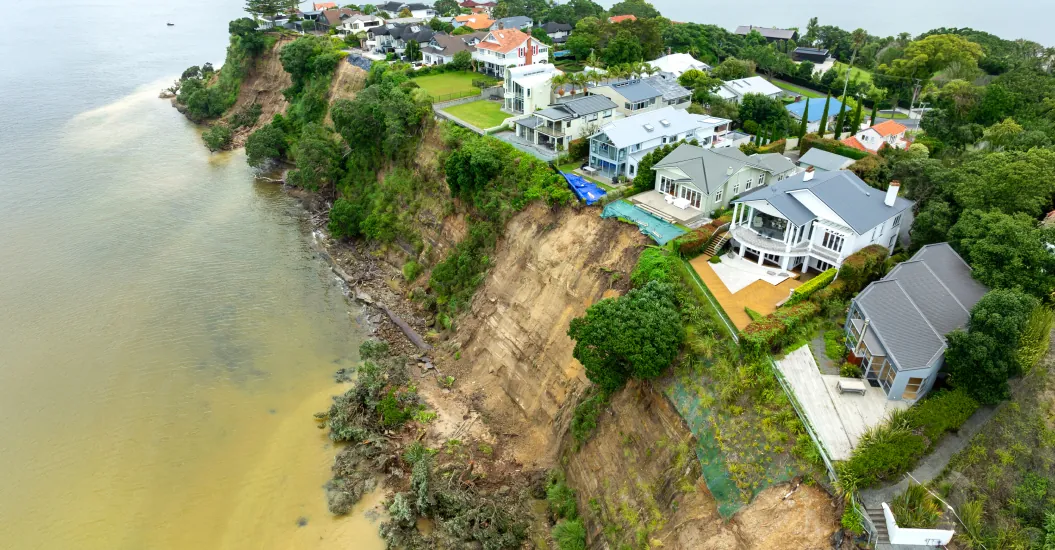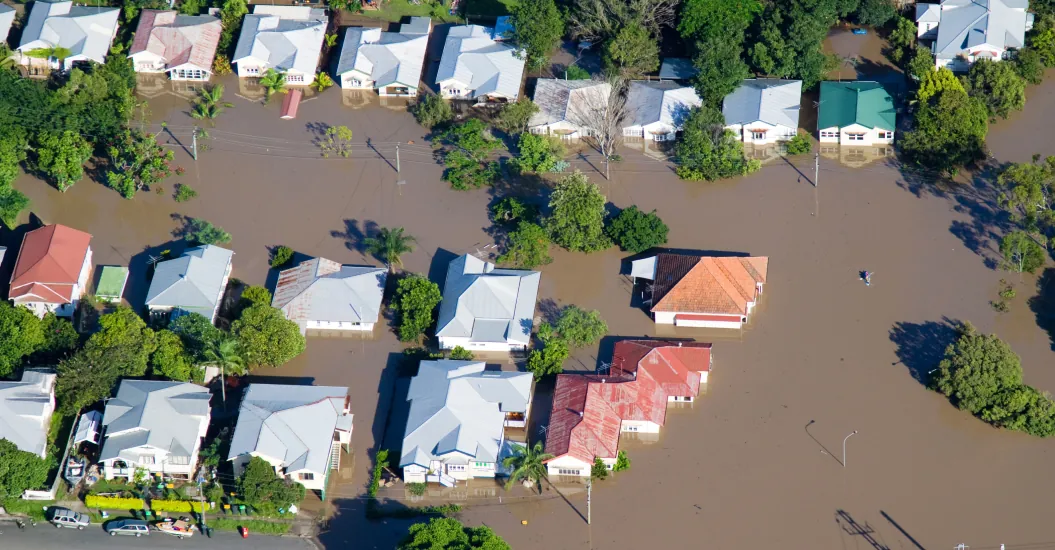Storms are common in New Zealand, bringing strong winds, heavy rain, hail, thunder and lightning. They can be quite disruptive and cause serious damage. But don't worry! Being prepared can help minimise the impact on you, your family, and your property.
Here's a handy guide on what to do before, during, and after a storm to help keep everyone safe and reduce any damage.
Before a storm
Stay informed
Keep an eye on weather forecasts and warnings from MetService. You can find their weather warnings online or download their app to get severe weather alerts when they're issued.
In case of a power cut, it's smart to have a radio handy to hear the latest advice from Civil Defence. If the power is still on, you can get more information from Civil Defence on TV, their website, and social media.
You might also receive an Emergency Mobile Alert from authorised emergency agencies. These messages are sent to capable mobile phones in targeted areas affected by serious hazards.
Prepare your home and belongings
Before the storm hits, it pays to get your home ready to reduce any potential damage. Here's how you can stay ahead:
Move it all up: To avoid flood damage, try to move things higher up if you can. Put smaller electronics on higher shelves. Keep valuables like jewellery, memorabilia, important documents, and medicines in waterproof bags.
Secure loose items: Bring outdoor furniture, umbrellas, and other loose items inside to keep them from flying around in high winds. Tie down your trampoline and if you're still worried, put sandbags around its legs for extra weight.
Inspect your garden: Strong winds can easily break branches and throw them around, potentially causing damage and injury. Regularly trim your trees and shrubs.
Heavy rain may trigger a landslide, so if you're living on a slope or there's one on or near your property, check out our blog on what to do in a landslide.
Clear gutters and drains: If it's safe, make sure your gutters are clear of debris to prevent water damage. Ensure your gutters and drains are securely attached. For more guidance, see our tips on how to clear your gutters.
Check your roof: If it's dry outside, and it's safe to do so, inspect your roof for any loose tiles or shingles and fix any issues to prevent leaks. Prioritise your safety by wearing protective clothing, and using a stable ladder on solid, level ground. If you have a house that's more than one storey, keep yourself safe and get the professionals in.
Don't forget your car: If you're worried about your car flooding, move it to a safe location on higher ground, away from power lines and trees. Parking near tall buildings can provide extra protection against flying debris. Make sure the windows are up, and all doors and the sunroof are securely closed. Don't forget to take your valuables with you!
If flooding isn't a concern, your garage is the safest place to keep your car.
Prepare your emergency grab bag
Make sure each family member has a grab bag packed with essentials like bottled water, non-perishable food, a first aid kit, torch, radio and batteries. Don't forget to include any necessary medication and store important documents in a waterproof bag. Check out our handy list for more items to include in your grab bag.
Create your emergency plan
Creating an emergency plan with your loved ones will ensure everyone knows what to do and where to go in an emergency. Get Ready helps you put together a plan online that you can share with family members and practice regularly. Make your emergency plan with Get Ready.
Review your insurance
Make sure your home and contents insurance is up to date, the amount you're covered for still suits your needs, and that you understand what is and isn't covered. If you don't have house or contents insurance, it's important to get these policies in place. Planning ahead and getting your insurance sorted well before any storm hits can make sure the stuff you love is covered!
Our house insurance calculator can help you estimate the cost to rebuild your home, while our contents insurance calculator can help you work out the value of your belongings and estimate the amount of cover you need to replace them.
Lastly, it's important you know how to reach out to your insurance provider, so keep their contact details handy. Most insurance providers will update their website and social media with the best way to get in touch during a storm.
Stand-down period
One thing to keep in mind is that most insurance providers will have a stand-down period from the day the insurance was bought.
If you're a Tower customer, there's a 72-hour stand-down period for any storm, flood, wildfire, tsunami, volcanic eruption, or landslide that happens within the first 72 hours of the start date of your policy. Cyclones that have been named before the start date of your policy are also affected by a stand-down period.
This means you won't be covered for any loss, damage, or liability arising from these events if they happen within that time frame.* Also, if you want to make changes to your policy like adjusting your sum insured, the stand-down period applies to those changes too.
Don't worry, if your new policy starts right after another one that covered these risks, or if you took out the policy at the same time you bought your house, the stand-down period doesn't apply.
For more details on the stand-down period check out the 'What you're not covered for' section in your policy documents.
During a storm
Stay indoors
Avoid going outside or driving unless it's absolutely necessary. Find a safe place inside your home, away from windows that could smash in strong wind or hail. Unplug anything electrical that's not in use to reduce any power surge damage if you experience a power cut.
If you're asked to evacuate, grab your emergency bag and leave straight away.
Stay in the loop
If you experience a power cut, bring out that battery-powered radio kept in your grab bag. This will be handy to stay informed about the storm's progress and hear any emergency instructions from Civil Defence.
Check in on your loved ones via text message or social media. This helps avoid using your mobile for calls and keeps the phone lines free for emergency services.
After a storm
Connect with loved ones
First things first, make sure everyone at home is okay. If anyone's hurt, get medical help right away. Check in with family, friends and neighbours, as some may need a bit of extra help. Use social media or text messages to keep the phone lines clear.
Stay safe
Safety is key after a storm. Watch out for hazards like downed power lines and flooding. Avoid walking or driving through floodwaters unless you're absolutely sure it's safe. Stormwater can be dangerous and toxic. If you're unsure about the water's safety, treat it as contaminated.
If you hear a hissing noise or smell gas at home, you might have a gas leak. Get everyone out immediately and turn off the gas at the mains or bottles if it's safe. Wait for a professional to check it out before turning the gas back on.
If water has entered your house, switch it off at the mains until your home has been checked by an electrician.
Follow Civil Defence and local authorities' instructions on where to avoid, where to get help, and what to do next.
Stay alert
Keep an eye out for more rain, hail, flooding, and landslides. These can still be a risk even after the storm has passed. Storms can weaken the ground, making landslides more likely, and further rain can worsen flooding.
Assess the damage
If you've had to evacuate your home during the storm, it's really important to wait for the green light from officials before heading back. Once it's safe, take a good look around your property for any damage to your home and belongings. After a heavy hailstorm, check for damage to your home and car. Heavy hail can act like ice bullets, damaging your roof, guttering, exterior paintwork, and even denting your car.
Don't forget to check your fridge! If you have contents insurance with Tower and your refrigeration or freezer equipment accidentally stops (think power cut!) and your food spoils, we'll cover the reasonable costs to replace it up to your policy limits. Even better, any claim under this part of the benefit will be excess-free!*
For more details on this benefit, check out the 'Spoiled food or refrigerated food' section in your policy documents.
If your property has taken a big hit, reach out to your local council for support and contact your insurance provider.
Need to make a claim? Here's what to do:
- Snap photos or take videos of any damage, including any spoiled food before disposal.
- Make a list of what's damaged, including any spoiled food before disposal.
- If you still have them, gather any receipts for damaged items.
Temporary accommodation
If you still don't have the green light to return home, and have no clue how long it'll be, you might need to find temporary accommodation. Don't worry, we've got you covered!
We'll cover reasonable temporary accommodation costs if your home becomes uninhabitable due to a covered loss, or if you're prevented from entering by government or local officials. This benefit also includes kennel or cattery fees for your furry family members.*
Just make sure to hang on to any accommodation receipts you get, as we'll review these as part of your claim.
Get in touch with Tower
If you've experienced any damage during the storm and need to make a claim, the quickest and easiest way to do this is through My Tower.** Have your supporting documents handy? Upload them at the same time to help us validate your claim twice as fast. The more information we have, the easier it is for us to process your claim.
Once we receive your claim, we'll review it. If it's approved, we'll get things started by assigning you a claims manager. They'll reach out to make any necessary arrangements like referring you to a repairer or supply partner. You can easily find your claim manager's contact details in My Tower if you need to get in touch.
Don't have a My Tower account? Register here now to quickly make a claim online**, wherever you are. For claims that can't be done through My Tower, you can use our online claims form.
Start the cleanup!
Once the storm has passed, you've documented the damage and submitted your claim, and you've received the all-clear to return home, it's time to jump into action.
Safety first! Make sure you're wearing protective clothing, including gloves and sturdy shoes. Watch out for sharp objects and hidden hazards.
Get started with temporary repairs to prevent further damage until the pros can drop by. Don't attempt to fix anything that will put your safety at risk! Cover broken windows, patch leaks, and secure anything that's come loose. Hold on to any receipts for materials you buy or services you use as this may be reimbursed under your policy.
Next up, tackle the outside. Clear away fallen branches, leaves, and other debris. High winds can damage trees and property. If a tree has fallen, call in the experts to handle it safely. If parts of your home have gotten wet, dry out these areas quickly to prevent mould and mildew. Lift wet carpet as it will dry faster off the floor and may not need replacing. Use fans, dehumidifiers, and open windows to speed up the drying process.
Don't attempt to secure your roof. If it has significant damage, contact Fire and Emergency for help. Clear out any debris from your gutters so you can have proper drainage. And if there are any problems with your gas, water and electricity, get the professionals in.
We're here for you
If you've experienced any damage in a storm, simply log in to My Tower to make a claim**. If you need further support, you can contact us through My Tower.
By following these steps, you can ensure that you and your home are well-prepared for any storm that comes your way. Stay safe, stay informed, and remember that Tower is here for you.
* Terms, conditions, exclusions and limits apply. Please read your Tower policy wording to understand these conditions.
**Claims for contract works, pet, travel, lifestyle and business insurance cannot be lodged through My Tower.
The links we provide to third-party websites are for your convenience and do not constitute any endorsement or authorisation by us. The information provided on this page is general in nature and is not intended to be professional or legal advice. Tower does not accept any liability for the accuracy or content of information on this website that belongs to third parties or on any third-party website.

Looking for house insurance?
Save $200 on new, eligible house insurance policies with promo code SWEETDEAL.*






